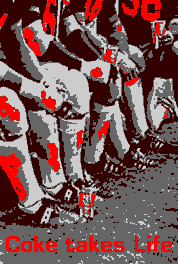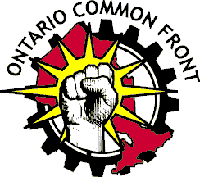|
from 8 & 16 december 2001 blue vol II, edition #14 & #15 |
| Feature Archive |
|
||||
|
International Human Rights Day, 10th December, 2001
by Murray D. Lumley
Reasons for our presence were read to the assembly, the names of murdered and jailed Coca-Cola workers were read out as well as the names of Colombians assassinated and disappeared during the months since September. During the reading of the names of those who have suffered, a two litre bottle of coke, representing the blood of the assassinated workers was poured into a galvanized pail that had attached to the outside, the printed names of the affected Colombian Coca-Cola workers. Then the pail of coke was carried to the steps of Gilmour Hall to be presented to Mary Keyes, assistant to McMaster President Peter George, who accepted it with our wishes that Dr. George take our message to the Coca-Cola representatives that he deals with. McMaster University has entered into a multi-year, multi-million dollar agreement to allow the Coca-Cola Corporation to have exclusive product sales rights on the campus.
Excerpts of the reading follow:
"We are here today on International Human Rights Day to remember and be in solidarity with those in Colombia, and particularly union workers of Colombia who are the victims of a massive project consisting of threats, kidnappings, disappearances and murder in order to terrorize and generally discourage anyone from belonging to a trade union.
"The reasons are based on much evidence, some of it experienced and heard by by myself, my friend Carolyn Konrad and 28 other Canadians when we visited Colombia this past August with the Canada-Colombia Solidarity Campaign. This deadly, dirty project has everything to do with preparing the soil of Colombia for the invasion of northern capital to turn Colombia into a cheap source of resources for multinational companies as part of the Free Trade Area of the Americas. The U.S. Plan Colombia, now extended to the whole Andean region under the disguise of a ‘war on drugs’ is one part of the plan to install a U.S. military presence to help put down insurgent groups and make Colombia safe for northern investment, to exploit the country’s rich resources as cheaply as possible. If poor people such as Afro-Colombians, Indigenous people, peasant farmers and union workers are in the way, they are being disposed of by accusing them of being insurgent sympathizers which makes them targets for the paramilitaries who are informal militaries under the command of and in close collaboration with the state military. They are paid for by the wealthy and powerful of Colombia and are the clients of the multinationals.
"The one case we are using to illustrate this dirty project is as follows:
"Today on International Human Rights Day, we as concerned Hamilton citizens and McMaster University students are going to symbolically pour Coca-Cola from one of the corporation’s trade mark containers into a pail which will then be presented to the President of McMaster University, Dr. Peter George.
"We plan to deliver to President George this symbolic liquid because of the fact that McMaster University has entered into a multi-year, multi-million dollar agreement to allow the Coca-Cola Corporation to have exclusive product sales rights on the campus.
"The hope is that McMaster will respond to the call by using its influence with Coca Cola to demand the changes necessary to secure human rights for Colombian workers
"This symbolic action is in solidarity with the lawsuit, filed in U.S. District Court in Florida, July 20, 2001, which accuses the Coca-Cola Company, its Colombian subsidiary and business affiliates of using paramilitary death squads to systematically murder, torture, kidnap and threaten union leaders at the multinational soft drink manufacturer’s Colombian bottling plants. The suit was filed by the United Steelworkers of America and the International Labour Rights Fund using a 200 year old U.S. law, on behalf of the union, known as Sinaltrainal, the estate of one of the murdered union leaders plus five other unionists who worked for Coca-Cola and were threatened, kidnapped or tortured by paramilitaries. The case against Coca-Cola includes documented evidence of death threats from the Florida based owners of the bottling companies in question, which are under the tight control of the Coca-cola parent company. Coca-Cola has a strict code of conduct for its bottlers which was not adhered to. Coca-Cola also ignored warnings of these threats, directly leading to the deaths and other harrassment of union workers.
"Colombia has long been the most dangerous country in the world for trade unionists, with more than 4,000 murdered in the past 15 years. The year 2000 saw 128 labour leaders assassinated (that number is already exceeded so far this year). Most of the killings have been attributed to right-wing paramilitaries who view union organizers as subversives and therefore legitimate targets in their war against Colombia’s guerrilla insurgents. Three out of every five trade unionists killed in the world are Colombians and on average, one is killed every three days. The assassinations and massacres in Colombia have shot up dramatically since September 11, perhaps due to the media glare being shone elsewhere.
"Needless to say, companies in Colombia, including Coca-Cola, benefit from the reduced effectiveness of union organizing that results from the intimidation of workers by paramilitaries. But the complaint filed against Coca-Cola claims that the company not only benefits from paramilitary violence; it orchestrates it!
"Those of us here today call upon Coca-Cola:
"As we pour the Coca-Cola we will call out the names of some who have been murdered for belonging to a trade union -
Canada's Investment Role
by Murray D. Lumley
By contrast, at Hamilton’s McMaster University, last week, members of the Canada-Colombia Solidarity Campaign spoke to an audience of eighty people giving a realistic and stark picture of how the optimistic sounding plans of the aforementioned organizations actually play themselves out on the ground in ‘southern nations’ like Colombia. Two of the speakers, visiting from Colombia, are on a tour of Canada sponsored by the Canadian Auto Workers Union. Francisco Ramirez is President of the 35,000 member Mine Workers Union of Colombia (Sintraminercol), and Berenice Celeyta is an anthropologist, lawyer and human rights activist.
Carolyn Konrad of Hamilton and myself, organizers of the McMaster event, had been part of the 30 member Canada-Colombia Solidarity delegation that visited six different parts of Colombia in August. We heard for ourselves how ordinary Colombians - members of unions, churches, organizations of peasant farmers, Afro-Colombians, women and youth are bravely working for peace in the face of assassinations and terror that is incorrectly interpreted by our media and Hollywood movies as "drug wars". While in Bogotá, our group met with more than twenty of these groups to hear their stories, that they wanted us to ‘make visible’ to Canadians.
At McMaster, Francisco told us that gold, silver, emeralds and other minerals have traditionally been mined by small operaters working under contract to the state mining company Minercol and protected from foreign intervention by the Colombian constitution. Recently, in anticipation of the Free Trade Agreement of the Americas (FTAA) being implemented, the Colombian government has allowed itself to be influenced by foreign mining companies including Canadian ones such as Corona and Conquistador, to have the government rewrite Colombia’s constitutional mining codes to remove protection of the small miners and allow for the dismantling of Minercol and the Mineworkers Union. Sintraminercol has denounced recent new mining codes sanctioned by President (of Colombia) Pastrana that would favour mining companies owned by his relatives, giving them enormous tax reductions, no environmental controls,and favourable operating conditions. Another force behind these plans is the proposed Bush-Cheney Energy plan which calls for a massive increase in coal fired electrical generating stations in the U.S.
This massive increase in the need for coal places Colombia on the front line for exploitation as it is already the world’s fourth largest exporter of coal. Huge multinationals such as Exxon corporation have already entered into partnerships with the Colombian government to mine and ship coal from Colombia far less expensively than they can produce it in North America due to the lax labour and environmental standards. This adversely affects coal mine employment in the U.S. and in the Canadian context of Nova Scotia. Other multinational energy companies, including Canadian ones, listed on the Vancouver Stock Exchange are also busily engaged in oil exploration and drilling. These companies have also been able to successfully lobby the Colombian government to extend both land area and length of time for exploration and extraction. Ecopetroleum, Colombia’s national oil company is already partially owned by multinationals.
The negative effects of these new policies extend to all union activity, and to the community. Community resistance and trade union work has resulted in massive assassinations of unionists, primarily by paramilitary forces which have been created by a few wealthy landholding families and the military, both of which use paramilitaries to do their dirty work. For their part, the relatively new Self-Defence Forces (AUC), the largest paramilitary group, say that they are simply defending the country against the two guerilla factions (FARC and ELN which have been around since the 1960’s and began as landless peasant movements) because the government and army are too weak to do so. According to the U.N. Colombia is the most dangerous place to be a trade union worker, with one assassination every three days ( the numbers so far this year are around 130). The armed groups do not directly fight each other. Instead they target ordinary people who they accuse of being sympathizers to one or another enemy faction. The paramilitaries are responsible for 80% of the deaths with the guerillas and army placing second and third. But all of the evidence points to close collaboration between the army and the paramilitaries. Both army officers and paramilitary commanders receive training in counter-insurgency tactics including assassination and torture at the school of the Americas, located in Fort Benning Georgia (where will occur on November 17 the large annual protest by peace activists).
All of these armed groups tax coca growers who are small farmers, and are forced into growing these crops because of the low world price of coffee and the low price for food crops (due in large part to subsidized farm prices in the north). This is now causing Colombia to import coffee and food. An additional factor is the removal of land from food production because of "land assembly" by wealthy landowners as they wait for the foreign investment to come from the north.
Francisco related a story which illustrates the ethical nature of the Colombian struggle and our part in it. He attended a meeting of foreign investors interested in Colombian mining at which he told the investors that he knew that they were placing gifts of money for Colombian government officials into Swiss bank accounts in return for changing laws to make foreign investment easier and more profitable, of course at the expense of Colombians and their environment. Later, in an informal conversation, one of the investors stated to him; "If my company doesn’t use bribes, others will. Therefore we have no choice." These are choices we Canadians need to be aware of and insist that Canadian companies not act to give us cheap goods and services in exchange for the misery and death of our brothers and sisters in Colombia.
Berenice augmented the stories told by Francisco. She said that the citizens most affected by violence are the organized groups, whether they be unions, women’s groups, human rights groups and ethnic citizen groups that are peacefully mobilizing against the war that is killing their families. She spoke of the massive displacements of people due to government sponsored violence against anyone in society that might work for people and local economies. There are 2.5 million people displaced by assassinations, massacres and fear in Colombia right now. 1.5 million of these are crowded into the capital city, Bogotá, adding to the population of six to seven million already there. Carolyn and I had an opportunity to visit some of the newly built barrios (neighbourhoods) which climb the mountainsides above the plateau of this mountain city. Approximately 46% of the displaced are Afro-Colombians. There is no coincidence that the active areas of displacemant are also the active areas of potential or active investment in mining, oil and mega-projects.
In addition to activity by private Canadian companies in resource extraction, the government of Canada is directly involved in two ways - the Canadian Development Agency invested $25 million in the Urra dam project on the Upper Sinu River that passes through the territory of the Embera-Katio Indigenous people. They were never consulted about the building of this dam that has resulted in the loss of their fishing livelihood due to blockage of the river and now the increase in Malaria and other diseases due to the standing water. When Embera leaders like Kimy Pernia protested the building of a second dam, paramilitayr repression was swift. Besides other of assassinations of Embera leaders, Kimy was abducted on June 2, 2001 and remains "disappeared".
Finally, I would like to relate the stories of two groups we heard from while in Colombia. We visited a group of ‘cut flower’ workers apparently on strike in tents just outside their job sites, which are huge acreages of plastic greenhouses on the outskirts of Bogotá. These can readily be seen from the air as one arrives or leaves, since the airport is also nearby. 65% of Canada’s cut flowers, like carnations and roses, are imported from these sites which are owned by interchangeable multinational companies Wesmax and Falcon. The workers who are 80% women are employed at a wage so low that even in Bogotá it is not possible to live on it alone. The two groups of workers we visited had been locked out for two and three months respectively. They told us that they had been presented with a ‘take it or leave it’ contract that demanded wage concessions and an increase of the work day from 14 to 15 hours. The workers did not belong to a union, but those that refused the new contract were locked out - approximately 300, while others chose to stay and work. The locked out group had now formed a union and have been lobbying the companies and their government for severance pay and for a contractual food allowance that they had not received from the companies for three years. The companies are breaking Colombian labour law with these practices, but the government has done nothing while the workers who maintain 24 hour vigils in their tents receive threats from men armed with machetes. The companies meanwhile have obtained buses to transport scab workers from Bogotá to replace the workers (which we saw happening), many with twenty years experience at growing flowers from seed, transplanting and packing them for shipment.
This cut flower industry, while providing some low paid employment, is destructive to land and people. Heavy pesticide spraying is required to which workers are exposed. We were told that pregnant women get to leave work for one hour after spraying. There is a noticeably higher rate of sterility among workers. The companies rent (not purchase) the land for the greenhouses for 15 - 20 years after which the soil is worthless to grow food such as grain which used to be a viable crop. The companies then move to other plots of land. The people in this community are beginning to realize that the employment may not be worth the health and environmental damage they are experiencing. According to the Flower Worker lobby group ‘CACTUS’ that our group visited, flower production for export is just one of many globalization schemes. World Bank loans have brought large-scale flower export industries to India, Kenya, Zimbabwe, Tanzania, Nicaragua, and Guatemala, in addition to Colombia, Ecuador, Peru, Bolivia and Chile in South America. These are perfect examples of corporate welfare. Corporations, such as Wesmax and Falcon get easy access to resources and cheap labour, while telling the world that they are missions to end poverty. Codes of conduct for flower companies and labelling to indicate - ‘union made’ - are some of the practices being promoted by CACTUS, (and they are receiving threats for speaking out). We in Canada should ask for evidence good practices before buying any more cut flowers.
Another group we heard from were members of the Food Workers Union, and in particular Coca Cola workers, who work in Coca Cola bottling plants throughout Colombia. They have suffered threats and assassinations from paramilitaries, including one particular assassination of a negotiating team member inside the offices of a bottling company during contract negotiations on November 29, 1999. The Coca Cola workers feel they have enough evidence of outright collusion between officers of the company and known paramilitaries, that they have initiated a court case to sue Coca Cola in Miami using a 1789 U.S. law that allows foreign access to U.S. courts to claim for reparations and damages especially for kidnappings, torture and killings. An indication of the strength of their suit is that the United Steel Workers of America are supporting and paying for the lawsuit. The suit is presently before a Miami court.
The Coca Cola workers also told us that they planned to announce a world boycott of Coca Cola products scheduled for the year 2002 to bring pressure on Coca Cola Corporation to behave lawfully in places like Colombia or suffer the loss of sales. The workers told us that as a consequence of these public actions, ‘many of us will not be alive to see the end result.’ Since McMaster University has entered into a ten year exclusive agreement for Coca Cola products to be sold on campus, it may be interesting to see how a boycott works itself out locally.
- by Murray D. Lumley
|
|||||


 "This liquid refreshment is intended to represent and be in memory of the blood of at least five Coca-Cola workers, murdered since 1994 in Colombia (one inside a Coca-Cola bottling plant during negotiations) for being members of the Coca-Cola workers union, Sinaltrainal. Many other Coca-Cola Union members at several Colombian Coca-Cola bottling plants, owned by American citizens living in Florida, have also been given the choice of quitting their union or be killed.
"This liquid refreshment is intended to represent and be in memory of the blood of at least five Coca-Cola workers, murdered since 1994 in Colombia (one inside a Coca-Cola bottling plant during negotiations) for being members of the Coca-Cola workers union, Sinaltrainal. Many other Coca-Cola Union members at several Colombian Coca-Cola bottling plants, owned by American citizens living in Florida, have also been given the choice of quitting their union or be killed.
 "The United Steel Workers of America and the International Labour Rights Fund join with Sinaltrainal in asking workers and consumers around the world to send a message to Coke to end the terror at the Coke facilities in Colombia and make reparations to the victims.
"The United Steel Workers of America and the International Labour Rights Fund join with Sinaltrainal in asking workers and consumers around the world to send a message to Coke to end the terror at the Coke facilities in Colombia and make reparations to the victims.

 This week, (beginning November 9), World Trade Organization (WTO) meetings were taking place in Qatar, Persian Gulf, a place chosen for its supposed inaccessibility to the anti-globalization protestors of Seattle, Washington and Quebec. The WTO, described as the most powerful organization on the planet was meeting to expand the General Agreements on Trade in Services (GATS). Also, from November 16-18 the G20 (developed nations) meetings of elite, unrepresentative members including components of the International Monetary Fund (IMF)and World Bank - were hastily invited to Ottawa, by Canada’s Finance Minister Paul Martin to guide the events of financial globalization.
This week, (beginning November 9), World Trade Organization (WTO) meetings were taking place in Qatar, Persian Gulf, a place chosen for its supposed inaccessibility to the anti-globalization protestors of Seattle, Washington and Quebec. The WTO, described as the most powerful organization on the planet was meeting to expand the General Agreements on Trade in Services (GATS). Also, from November 16-18 the G20 (developed nations) meetings of elite, unrepresentative members including components of the International Monetary Fund (IMF)and World Bank - were hastily invited to Ottawa, by Canada’s Finance Minister Paul Martin to guide the events of financial globalization.
 The second Canadian involvement has been with the U.S. Plan Colombia, a $1.3 billion, mostly military aid program of coca and narcotrafficking eradication in Colombia. It is also no coincidence that the fumigation by Plan Colombia (using Monsanto’s Roundup) of small farms including food crops, animals, people and jungle where coca is grown is also in areas such as Putamayo in the south of the country where large deposits of oil have been discovered. Plan Colombia has been accurately described by Colombians such as Berenice and Francisco not as a war on drugs but as a counterinsurgency measure, to clear out guerillas and people so that it will be possible to extract oil and other resources as cheaply as possible under the protection of the U. S. Military. In the year 2000, Canada sold a number of its surplus helicopters to the U. S., which were then outfitted with military equipment to serve in Colombia. This represents a loophole in and violates the spirit of - Canadian law which is supposed to ban the sale and use of military materials to a governments which allow human rights violations as Colombia does. Berenice described Colombia’s impunity rate as being at 98%, meaning that violent crime goes unpunished at that rate. In July 2000, Colombian church leaders wrote to Christians in the United States and Canada as well as to then U.S. President Clinton and to Congressional members, asking for the military component of Plan Colombia to be transformed to social aid such as housing. This plea was ignored with continuing disastrous results for the Colombian people. The ‘Plan’ is currently under review in the U.S. Congress.
The second Canadian involvement has been with the U.S. Plan Colombia, a $1.3 billion, mostly military aid program of coca and narcotrafficking eradication in Colombia. It is also no coincidence that the fumigation by Plan Colombia (using Monsanto’s Roundup) of small farms including food crops, animals, people and jungle where coca is grown is also in areas such as Putamayo in the south of the country where large deposits of oil have been discovered. Plan Colombia has been accurately described by Colombians such as Berenice and Francisco not as a war on drugs but as a counterinsurgency measure, to clear out guerillas and people so that it will be possible to extract oil and other resources as cheaply as possible under the protection of the U. S. Military. In the year 2000, Canada sold a number of its surplus helicopters to the U. S., which were then outfitted with military equipment to serve in Colombia. This represents a loophole in and violates the spirit of - Canadian law which is supposed to ban the sale and use of military materials to a governments which allow human rights violations as Colombia does. Berenice described Colombia’s impunity rate as being at 98%, meaning that violent crime goes unpunished at that rate. In July 2000, Colombian church leaders wrote to Christians in the United States and Canada as well as to then U.S. President Clinton and to Congressional members, asking for the military component of Plan Colombia to be transformed to social aid such as housing. This plea was ignored with continuing disastrous results for the Colombian people. The ‘Plan’ is currently under review in the U.S. Congress.
